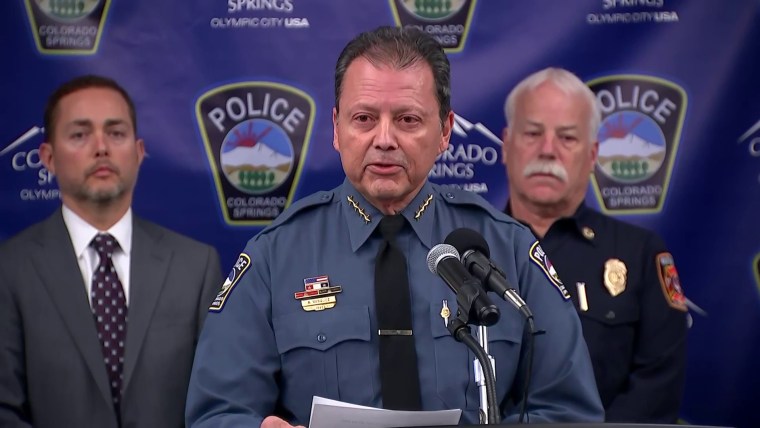Coloradans Hold Vigil After Mass Shooting At Gay Club; 5 Killed; Suspect Grandson of MAGA Pol
Hearts around Colorado and the country are hurting and mourning the loss of five lives in a mass shooting in a LGBTQ+ club in Colorado Springs.
Hundreds showed up outside All Souls Unitarian Universalist Church in Colorado Springs for a community vigil on Sunday morning. The church was standing-room only, so organizers held the vigil in waves to keep up with demand.
Gov. Jared Polis and his husband, Marlon Reis, spoke to the crowd via Zoom.
“My heart breaks,” said Polis, who recently tested positive for COVID-19. Polis spoke with the owners of Club Q this morning. He described the nightclub as a safe haven “in an area where it hasn’t always been easy” for people in the LGBTQ+ community.
Club Q owners Nic Grzecka and Matthew Haynes spoke at the vigil.
“Club Q doesn’t have customers,” Haynes said. “Club Q has family and community.”
At least five people were killed and another 25 injured in the attack at Club Q just before midnight, Saturday Nov. 19. Colorado Springs police say at least two people at the club stopped the gunman, who is now in custody at the hospital.
According to Club Q’s social media posts, the nightclub had planned on Sunday to celebrate Transgender Day of Remembrance, which takes place Nov. 20 each year to honor and the remember the lives of transgender people who died from violence.
Two people subdued the gunman who opened fire at Club Q, a Colorado Springs LGBTQ nightclub late on Saturday, saving lives, officials say.
“While the suspect was inside of the club, at least two heroic people inside the club confronted and fought with the suspect and were able to stop the suspect from continuing to kill and harm others,” said Colorado State Police Chief Adrian Vasquez at a news conference Sunday morning. “We owe them a great debt of thanks.”

Officials identify suspect in Colorado Springs gay nightclub shooting, motive still unknown
NOV. 20, 202201:07
Colorado Gov. Jared Polis, who in 2018 was the first openly gay male to be elected governor, said “brave individuals” stepped in during the “horrific, sickening and devastating” shooting that has killed at least five people and injured over two dozen.
“We are eternally grateful for the brave individuals who blocked the gunman likely saving lives in the process and for the first responders who responded swiftly to this horrific shooting,” he said in a statement issued Sunday morning. “Colorado stands with our LGTBQ community and everyone impacted by this tragedy as we mourn together.”
Heavy.com reports:
Heavy has confirmed that Aldrich is the grandson of outgoing Republican state Rep. Randy Voegel, the former mayor of Santee, California. There were calls to expel Voepel from the state Assembly after he made comments comparing the January 6 attacks to the Revolutionary War. Aldrich’s mother, Laura Voepel, has written posts praising Randy Voepel on Facebook and confirming he is her father.
“This is Lexington and Concord. First shots fired against tyranny,” Randy Voepel, who was defeated in a Republican primary in August 2022, said in a San Diego Union-Tribune article three days after January 6. “Tyranny will follow in the aftermath of the Biden swear-in on January 20th.” Authorities have not yet released a photo of Aldrich; the photos Heavy has found are a few years old, so he looks younger in them than he likely looks today.
Read the full article. Hit the link, there’s much more.
GLAAD calls Club Q shooting ‘horrific tragedy,’ says ‘vile rhetoric’ and anti-LGBTQ legislation responsible for the attack
The Gay & Lesbian Alliance Against Defamation released a statement on the Club Q mass shooting on Sunday, calling it a “horrific tragedy.”
“This unspeakable attack has robbed countless people of their friends and family and an entire community’s sense of safety,” said Sarah Kate Ellis, the president and chief executive officer of GLAAD.
Ellis also said that false rhetoric and anti-LGBTQ legislation is responsible for attacks like this one on the community.
“You can draw a straight line from the false and vile rhetoric about LGBTQ people spread by extremists and amplified across social media, to the nearly 300 anti-LGBTQ bills introduced this year, to the dozens of attacks on our community like this one,” she said. “The media must stop spreading misinformation and elevate the truth that LGBTQ people exist, belong and want to live in peace and safety. Elected officials and corporate leaders must act immediately to prioritize this truth, and protect everyone’s safety.”
The mass shooting that claimed the lives of at least five people and injured more than two dozen happened on the eve of the Transgender Day of Remembrance, an annual observance that started in 1999 to honor the memory of transgender people killed in acts of anti-trans violence, according to GLAAD.
Fundraisers:
- Club Q recently shared the preferred donation site for victims of the shooting. It said in the post, “this is a state run organization to help victims, please please donate.”
- GoFundMe has also recently verified two fundraisers while it’s Trust & Safety team works to monitor others.
- Faith Haug of Good Judy Garage, a small, LGBTQ+-owned and operated business in Denver, launched a GoFundMe to raise funds for the families of the victims killed in the tragic shooting, as well as to help those injured with medical expenses.
- Greg Resha of Colorado Springs is a former employee of Club Q. The fundraiser organizer launched a GoFundMe to help the families of the victims, as well as those who were injured.
